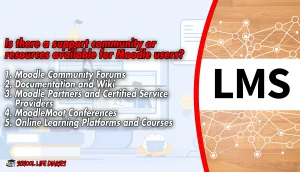The Moodle learning management system (LMS) has gained significant popularity in the field of education due to its numerous advantages and benefits for both educators and students. LMS refers to a software application that allows for the creation, delivery, tracking, and management of educational courses or training programs. Moodle, specifically, is a widely used open-source LMS that provides a flexible and customizable platform for online learning.
One of the key advantages of Moodle is its ability to provide learners with freedom in their educational pursuits. With Moodle, students have the flexibility to access course materials at any time and from anywhere with an internet connection. This means that they are not bound by traditional classroom settings or fixed schedules, allowing them to learn at their own pace and convenience.
What is LMS?
The term Learning Management System (LMS) refers to a digital platform designed to facilitate the creation, delivery, and administration of educational content in an efficient and organized manner. It provides educators with a comprehensive set of tools to create online courses, manage students’ progress, and assess their performance. One of the key features of an LMS is its ability to provide a centralized location for all course materials, including lectures, readings, assignments, and quizzes. This allows students to access these resources at any time and from anywhere with an internet connection.
LMSs offer various communication tools that enable seamless interaction between teachers and students. Discussion forums allow learners to engage in meaningful conversations about course topics or seek clarification on concepts they find challenging. This fosters collaboration among peers and encourages active participation. Most modern LMSs incorporate messaging systems that facilitate direct communication between instructors and individual students or groups.
When comparing traditional classroom learning with LMS-based education, several advantages become apparent. An LMS offers flexibility in terms of time and location. Learners can access course materials at their convenience without being bound by fixed class schedules or physical locations. This freedom allows individuals to learn at their own pace while juggling other commitments such as work or family responsibilities. An LMS provides personalized learning experiences through adaptive technologies that cater to each student’s unique needs.
Overall, Learning Management Systems have revolutionized the way education is delivered by providing a digital platform for creating engaging content, facilitating communication between instructors and learners, as well as offering flexibility in terms of time and personalization options not found in traditional classrooms. As technology continues to advance rapidly, it is likely that LMSs will play an increasingly significant role in shaping the future of education worldwide.
What is a Moodle-based Learning Management System?
A Moodle-based Learning Management System is a web-based platform that provides users with an interactive and accessible environment for educational purposes. Moodle, short for Modular Object-Oriented Dynamic Learning Environment, is an open-source software that allows educators to create online courses, manage student enrollment, deliver content, and facilitate communication and collaboration among learners. It offers a wide range of advantages that make it a popular choice for educational institutions around the world.
One of the key advantages of using Moodle as a learning management system is its flexibility and customization options. Educators can tailor their online courses to suit the specific needs of their students by choosing from a variety of features and tools available within the platform. They can design engaging activities, quizzes, forums, and assignments that promote active learning and critical thinking.
A Moodle-based Learning Management System offers numerous advantages for educators and learners alike. Its customizable features promote active engagement in online courses while providing flexibility in designing instructional materials. Moreover, its ease of implementation makes it accessible even for those with limited technical expertise. With these benefits in mind, it’s no wonder that many educational institutions choose Moodle as their preferred learning management system for delivering high-quality online education experiences.
5 Reasons Why Is Moodle The World’s Best LMS?
Moodle, an acronym for Modular Object-Oriented Dynamic Learning Environment, is a widely acclaimed Learning Management System (LMS) that has gained a reputation as one of the best in the world. There are several reasons for this, based on its features, versatility, and impact on the education sector. Here are five key reasons why Moodle is often considered the world’s best LMS:
1. Open-Source and Customizability:
Moodle is an open-source platform, which means its source code is freely available, allowing for customization and adaptability based on specific needs and requirements. This open-source nature enables educational institutions, businesses, and organizations to tailor the LMS to fit their unique learning objectives, content, and branding. Customizability ensures that Moodle can be modified to align with various teaching methodologies and organizational structures, making it highly flexible and adaptable.
2. Robust Feature Set:
Moodle offers a comprehensive set of features that cater to a wide range of educational needs. It includes tools for content creation, course management, grading and assessment, communication, collaboration, and analytics. Features like forums, quizzes, assignments, interactive content creation, progress tracking, and reporting mechanisms enhance the overall learning experience for both educators and learners. The diverse set of features allows for efficient course delivery and assessment, making it a powerful tool for e-learning.
3. Scalability and Accessibility:
Moodle is designed to accommodate varying user volumes and can scale to support small to large organizations with thousands of users. It can handle diverse educational settings, from K-12 schools to universities and corporate training environments. Moodle is accessible across devices (desktops, laptops, tablets, and smartphones) and supports multiple languages, making it an inclusive platform that can reach learners worldwide.
4. Active Community and Support:
The Moodle community is extensive and highly active, comprising developers, educators, administrators, and learners. This community collaborates to improve the platform continuously, sharing resources, plugins, themes, and solutions to common challenges. The collective expertise and collaboration ensure that Moodle remains updated, secure, and aligned with evolving educational trends. The community provides a wealth of documentation, forums, and support channels, enabling users to seek assistance and guidance promptly.
5. Cost-Effectiveness:
As an open-source LMS, Moodle is cost-effective, especially when compared to proprietary alternatives. The absence of licensing fees lowers the total cost of ownership, making it an attractive option for organizations with budget constraints. The savings can be redirected towards enhancing the learning experience or expanding the educational offerings. The ability to customize Moodle reduces long-term costs associated with dependence on external vendors for modifications or updates.
In conclusion, Moodle’s open-source nature, flexibility, rich feature set, scalability, active community, and cost-effectiveness make it a compelling choice for a diverse range of educational institutions and organizations globally. Its ability to adapt to the unique needs of educators and learners positions it as one of the world’s leading Learning Management Systems.
5 Main benefits Of Moodle for students:
Certainly! Moodle, an open-source Learning Management System (LMS), provides students with numerous benefits that enhance their learning experience and academic success. Here are five main benefits of Moodle for students:
1. Accessibility and Flexibility:
Moodle offers students the flexibility to access course materials, assignments, and resources at any time and from anywhere with an internet connection. This accessibility ensures that students can tailor their learning schedules to fit their individual needs and commitments, promoting a self-paced learning approach. Whether it’s reviewing course content, completing assignments, or participating in discussions, Moodle’s accessibility enhances overall convenience and efficiency for students.
2. Interactive Learning Experience:
Moodle facilitates an interactive learning environment by incorporating various multimedia elements such as videos, interactive quizzes, discussion forums, and collaborative activities. Students can engage with course content in dynamic ways, enhancing their understanding and retention of the material. Interactive features promote active participation, critical thinking, and knowledge sharing among students, fostering a more engaging learning experience.
3. Instant Communication and Collaboration:
Communication is vital for successful learning, and Moodle provides a platform for seamless interaction between students and instructors. Students can ask questions, seek clarification, and participate in discussions within the LMS. Additionally, Moodle enables collaborative group work, encouraging students to work together on projects and assignments. The communication and collaboration tools within Moodle enhance peer-to-peer interaction and facilitate a supportive learning community.
4. Personalized Learning Paths:
Moodle allows educators to personalize the learning experience by tailoring content, assessments, and activities based on individual student needs and performance. Adaptive learning techniques, personalized assignments, and automated grading systems help students receive targeted feedback and recommendations for improvement. This personalized approach ensures that each student’s unique learning style and pace are considered, ultimately enhancing their understanding and mastery of the subject matter.
5. Track Progress and Performance:
Moodle offers a comprehensive set of tracking and reporting tools that enable students to monitor their progress and performance throughout the course. Students can view their grades, review completed assignments, and track their engagement with course materials. This transparency provides valuable insights into their strengths and areas for improvement, empowering students to take responsibility for their learning journey and make informed decisions to enhance their academic performance.
In summary, Moodle provides students with accessibility, interactive learning experiences, instant communication and collaboration, personalized learning paths, and the ability to track progress and performance. These benefits contribute to a more effective and engaging learning process, supporting students in achieving their educational goals and fostering a deeper understanding of the subject matter.
What kind of content can be delivered through Moodle?
Various types of educational content, such as course materials, quizzes, assessments, interactive discussions, and collaborative activities, can be effectively delivered through the Moodle e-learning platform. Moodle offers a range of interactive activities that engage students in active learning. Instructors have the ability to create online quizzes and assignments that assess students‘ understanding of the course material. These assessments can be automatically graded by the system, saving instructors time and providing immediate feedback to students.
Moodle also facilitates collaborative activities among students. Group projects can be easily managed through Moodle’s features such as discussion forums or shared document editing tools. Students can collaborate on assignments regardless of their physical location or time zone by accessing Moodle remotely. This promotes teamwork skills while fostering an inclusive learning environment.
Moodle offers a wide range of content delivery options including interactive activities, multimedia resources, and assessments. These features enhance student engagement and promote active learning by providing opportunities for interaction with peers as well as access to diverse resources beyond traditional textbooks or lectures.
Is Moodle user-friendly for both educators and students?
Conclusively, the user-friendliness of Moodle is apparent to both educators and students alike. Moodle has been designed with accessibility in mind, ensuring that all users can easily navigate and interact with the platform. Its intuitive interface allows for a seamless user experience, enabling educators to efficiently create and manage course content, while students can easily access and engage with the learning materials.
One of the key reasons why Moodle is considered user-friendly is its extensive range of training resources available to both educators and students. Moodle provides comprehensive documentation, tutorials, and video guides that assist users in understanding how to effectively use the platform. This not only facilitates a smooth onboarding process but also empowers users to fully utilize the features and functionalities offered by Moodle.
Moodle’s adaptable nature allows educators to customize their courses according to their preferences and teaching style. With a plethora of options for organizing content, creating assessments, and facilitating communication among students, educators have the freedom to tailor their courses to meet specific learning objectives. This flexibility enables them to create engaging learning experiences that cater to diverse student needs.
Is there a support community or resources available for Moodle users?
Yes, Moodle boasts a robust and vibrant support community, making it a standout choice for users seeking assistance, collaboration, and resources. The global community of Moodle users is extensive, comprising educators, administrators, developers, and enthusiasts who actively engage in sharing knowledge and expertise. There are various avenues through which users can access support and resources:
1. Moodle Community Forums:
Moodle hosts an online community forum where users can ask questions, seek advice, and share experiences. The forums cover a wide array of topics, from technical issues to best practices in e-learning and course design. Experienced users often provide prompt and helpful responses to queries, offering valuable insights and solutions.
2. Documentation and Wiki:
Moodle offers comprehensive online documentation and a wiki that serves as an extensive knowledge base. Users can find step-by-step guides, tutorials, and FAQs, covering various aspects of setting up, configuring, and using Moodle effectively. These resources are continuously updated and provide in-depth information to both new and experienced users.
3. Moodle Partners and Certified Service Providers:
Moodle has a network of certified service providers and partners globally. These organizations offer specialized services, training, customization, and support tailored to specific user needs. Users can engage with these professionals for expert guidance and assistance in implementing Moodle effectively within their educational institutions or organizations.
4. MoodleMoot Conferences:
MoodleMoots are worldwide conferences dedicated to Moodle, where users, educators, developers, and administrators come together to discuss trends, innovations, and best practices related to Moodle. These events offer an excellent opportunity for networking, learning from peers, and gaining insights into how others are using Moodle to enhance their teaching and learning experiences.
5. Online Learning Platforms and Courses:
Numerous online platforms offer Moodle-related courses and tutorials for users looking to deepen their understanding of the LMS. These courses cover various aspects, from basic navigation to advanced customization and administration. They provide a structured learning experience for users at different proficiency levels.
In summary, Moodle users have access to a vibrant and diverse support community that includes online forums, extensive documentation, certified service providers, MoodleMoot conferences, and specialized training courses. This wealth of resources ensures that users can readily find the assistance, knowledge, and expertise they need to optimize their use of Moodle and create effective e-learning experiences.
Conclusion: Moodle Learning Management System
In conclusion, Moodle is a highly advantageous Learning Management System (LMS) that offers numerous benefits for both educators and students. Its user-friendly interface and extensive features make it an excellent platform for delivering various types of content, including multimedia, quizzes, assignments, and discussions. The availability of a support community and resources further enhances the learning experience for users.
One of the key advantages of Moodle is its flexibility in accommodating different learning styles and preferences. It allows students to access course materials at their own pace and provides opportunities for interactive engagement through forums and chat functions. Additionally, Moodle’s ability to track student progress and provide timely feedback promotes a more personalized learning experience. Moodle fosters collaboration among students by facilitating group projects and peer assessment activities.
In summary, Moodle’s effectiveness as a Learning Management System lies in its ability to provide a versatile platform for content delivery while promoting interactive engagement among students. Its user-friendly interface ensures ease of use for both educators and learners alike. With its wide range of features and support community available, Moodle proves to be an invaluable tool in enhancing the educational experience for all parties involved.











